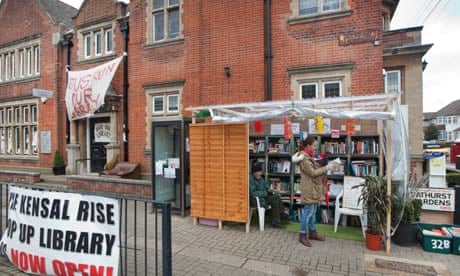The fight to keep libraries open has dominated the headlines but the UK has quietly lost more than 200 branches over the past year, according to a detailed national survey.
The rate of library closures has increased, reveals the annual report from the Chartered Institute of Public Finance and Accountancy: 146 branches closed between 2010 and 2011, with the number stepping up to 201 this year. The UK now has 4,265 libraries, compared with 4,612 two years ago, and the number of closures is likely to grow. Campaigners in Newcastle are currently fighting plans to close 10 out of the city's 18 libraries, with Billy Elliot playwright Lee Hall calling on the council to protect the city's heritage last month.
"Working men and women in the north-east have fought, generation after generation, for the right to read and grow intellectually, culturally and socially – to be as 'civilised' as anyone else," Hall said. "It is a heritage that took decades and decades to come to fruition but will be wiped out in a moment. You are not only about to make philistines of yourselves, but philistines of us all."
Librarian numbers have fallen in line with branch closures, claimed the CIPFA survey on Monday, down 8% in the year to March 2012 compared with a 4.3% fall the previous year, while the number of volunteers working in libraries continues to rise – up by 8.9% this year – as councils hand over responsibilities for local branches to residents.
Visits to libraries across the UK have also dropped, down 2.4% to 306.6m and down 6.7% compared with five years ago, when there were 328.5m visits. Adults are borrowing less fiction – down 5.4% – and less non-fiction – down 7.3% – with the only growth seen in borrowing of children's fiction, up 0.3%.
"Local authorities across the UK are working hard to identify savings and reduce their spending. Although there has been a large increase in the number of libraries and mobile libraries closing, it is important to note that the largest, most popular and most viable libraries are largely staying open," said Julian Mund, CIPFA's product development director. The UK's busiest library was, again, the Norfolk and Norwich Millennium library, with 1.18m books issued and 1.34m visitors.
The decline in numbers comes as fresh analysis from the Society of Chief Librarians shows that libraries are no longer used merely for borrowing books. Looking at internal data over the last 10 years, the society identified five main users of libraries: "career builders", who use their libraries' resources to write CVs and practise interviews in meeting rooms; "health detectives", who track down information about particular conditions; "little learners", five- to 10-year-olds who love reading; "friend finders", who use libraries to meet people in their local communities; and "research sleuths", who track down information about their family or community histories.
Carol Handley, who falls into the "friend finder" user group, found her local branch, Biddulph library in Staffordshire, became a lifeline after she retired from her role as an assistant head teacher, and found she knew no one locally. "It was as if my husband and I were marooned on a desert island. Such was the isolation of the older person who has no cause to frequent the school, the pub or the church," she said. "Then one day, overhearing me ask the shopkeeper if my crochet magazine had arrived, a total stranger suggested I come to the Knit and Natter group meeting in Biddulph library on Wednesday afternoon … It seems an exaggerated claim, I know, but the ensuing visit to the library has made such a radical change to my life. As a result, not only do I have a group of friends who share a common interest, who can offer support, advice, humour and some good homespun companionship but also a function in the community."
She still visits the library every week. "I have a first class honours degree, a masters degree, the National Professional Qualification of Head Teachers and was successful in my career – yet I could not find my own way out of increasing isolation," she said. "I really want you to know how very much appreciated the library is. It is not only the place for the physical resources of books and other media, computers and access to information, but it quietly, unassumingly, provides the real social networking that permits individuals to grow within and as part of a community."
Janene Cox, president of the Society of Chief Librarians, said the organisation's research "really demonstrates the vital role that the library service plays within local communities today", and "how that role has changed and developed from something that was quite passive into a service that is now dynamic and interactive".
She added: "Communities are engaging with our services in lots of different ways and for lots of different reasons but what is clear is that the service which they receive is hugely valued and the experience unique. This research will form a vital role in demonstrating the multiple roles of libraries to local authorities."
Miranda McKearney, director of The Reading Agency, agreed. "[The] research findings show the powerful social benefits libraries bring to their communities. No wonder the public feel so strongly about them," she said. "We hope the research will provide useful advocacy material at a time of great pressure."

Comments (…)
Sign in or create your Guardian account to join the discussion